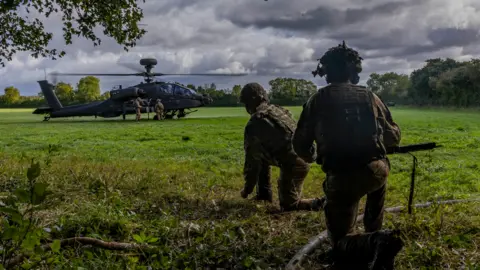The Army's Apache helicopter passes battlefield test
 British Army
British ArmyA new Apache helicopter has passed its battlefield test after an exercise involving 8,000 personnel, the Army said.
The 3 Regiment Army Air Corps (AAC), based at Wattisham Flying Station in Suffolk, has tested the maintenance and operation of the AH-64E.
As part of the testing process, simulated strike missions were completed in Northumberland and Kent.
The regiment's Lt Col Rich Simcock called the AH-64E "revolutionary".
 British Army
British ArmyThe helicopter entered service in 2021, and replaced the Apache Mk 1, which had been recently used in Afghanistan and Libya.
According to the Army, the Boeing-built AH-64E has state-of-the-art features, including uncrewed aircraft systems and embedded maintenance diagnostic systems.
Lt Col Simcock said: "The step change it brings in lethality, agility, survivability and how it can communicate and integrate with other capabilities is nothing short of revolutionary.
"To achieve validation, every single function that we deliver as a regiment has been tested in a realistic scenario that reflects the challenges of modern operations."
 British Army
British ArmyAcross six weeks, 3 Regt AAC deployed from its Wattisham base to set up temporary facilities at Nesscliffe in Shropshire, before it moved to Eaglescott and Chivenor in Devon.
Strike missions were carried out on simulated enemy positions as far apart as Otterburn in Northumberland and Lydd in Kent, the Army said.
The manoeuvres involved 8,000 troops working out of 22 locations across south-west England, the West Midlands and Wales.
Following this, the first regiment flying the new Apache has been declared ready for frontline duty.
Lt Col Simcock said: "Like any machine, the AH-64E is only as good as the people who operate it. To have got to where we are just two years after the first aircraft arrived in the UK reflects the hard work and dedication put in by everyone in the regiment."
The Army said the armed helicopter was a key element of how it would fight in the coming decades, as set out in the Future Soldier transformation programme.

Follow East of England news on Facebook, Instagram and Twitter. Got a story? Email [email protected] or WhatsApp on 0800 169 1830
